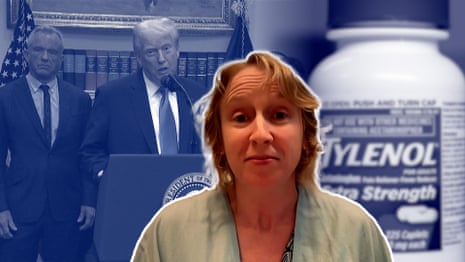Global health agencies and regulators have dismissed unscientific advice from Donald Trump that made an unproven link between autism and the use of everyday painkillers and vaccines.
In a sign of how worried foreign governments are about the US president’s comments, the health secretary of the UK, which is one the US’s closest allies, told the British public they should not “pay any attention whatsoever to what Donald Trump says about medicine”.
On Monday, Trump told pregnant women to avoid taking acetaminophen, which is sold in the US as Tylenol and known internationally as paracetamol, adding that those who could not “tough it out” should limit their intake.
He also said – in comments that risk exposing children to fatal diseases – that parents of young children should delay or avoid some vaccines. “Don’t let them pump your baby up with the largest pile of stuff you’ve ever seen in your life,” he said.
The World Health Organization said on Tuesday that questioning the value of lifesaving vaccines was misguided and that evidence linking paracetamol use in pregnancy and autism was “inconsistent”.
“We know that vaccines do not cause autism,” said the WHO spokesperson Tarik Jašarević. “Vaccines, as I said, save countless lives. So this is something that science has proven, and these things should not be really questioned.”
Wes Streeting, the UK health secretary, was even more direct in his criticism, telling ITV: “I trust doctors over President Trump, frankly, on this. I’ve just got to be really clear about this: there is no evidence to link the use of paracetamol by pregnant women to autism in their children. None.
“So I would just say to people watching: don’t pay any attention whatsoever to what Donald Trump says about medicine. In fact, don’t take even take my word for it, as a politician – listen to British doctors, British scientists, the [National Health Service].”
 Autism expert says Trump’s Tylenol claims ‘aren’t based in fact’ – video
Autism expert says Trump’s Tylenol claims ‘aren’t based in fact’ – video
Hours after Trump made his comments, the MHRA, the UK’s healthcare regulator, released a statement saying there was no evidence linking paracetamol use during pregnancy with autism.
Dr Alison Cave, chief safety officer at the agency, warned that “untreated pain and fever can pose risks to the unborn baby” and it was important to manage these symptoms with recommended treatments.
The European Medicines Agency also stuck by its guidelines. The EU agency’s chief medical officer, Steffen Thirstrup, said its advice was “based on a rigorous assessment of the available scientific data and we have found no evidence that taking paracetamol during pregnancy causes autism in children”. When asked, an EU commission spokesperson referred to the EMA findings.
The Therapeutic Goods Administration, the medicines regulator in Australia, confirmed paracetamol was safe for use in pregnancy and rejected the link to neurodevelopmental conditions.
It issued a statement saying it would “join with other global medicines regulators, leading clinicians and scientists worldwide in rejecting claims regarding the use of paracetamol in pregnancy, and the subsequent risk of development of ADHD or autism in children”.
skip past newsletter promotion
Our morning email breaks down the key stories of the day, telling you what’s happening and why it matters
Privacy Notice: Newsletters may contain information about charities, online ads, and content funded by outside parties. If you do not have an account, we will create a guest account for you on theguardian.com to send you this newsletter. You can complete full registration at any time. For more information about how we use your data see our Privacy Policy. We use Google reCaptcha to protect our website and the Google Privacy Policy and Terms of Service apply.
after newsletter promotion
Trump made his announcement alongside his health secretary, Robert F Kennedy Jr, who has a record of making unproven claims about autism and other conspiracy theories linked to health and vaccines.
Earlier this year, Kennedy pledged to determine the “cause” of autism and announce the findings this month. Monday’s press conference appears to be an effort to provide results on the deadline Kennedy set himself, although he failed to give any new information backed by science.
Experts say that finding the underlying factors of a complex syndrome that has been studied for decades was unrealistic.
Autism diagnoses have been rising. One in 31 children aged eight had a diagnosis of autism spectrum disorder in the US in 2022, according to the Centers for Disease Control and Prevention. That compares with about one in 150 in 2000.
Doctors believe there are two main reasons for the rise, and neither relates to vaccines or medication. First, the definition of autism has broadened. Second, parents have increasingly sought a diagnosis of autism, which has become better known publicly.
In its assessment, the White House appears to be relying on a 2025 review of 46 earlier studies that suggested an association between prenatal paracetamol exposure and an increased chance of neurodevelopmental disorders. Critically, those researchers said the study did not prove the drug caused the outcomes and advised that pregnant women should continue to use acetaminophen at the lowest possible dose and for the shortest possible period.
Health experts have pointed instead to a large Swedish study published in 2024, which tracked 2.4 million births and found no evidence of an association between prenatal exposure to the drug and autism.

